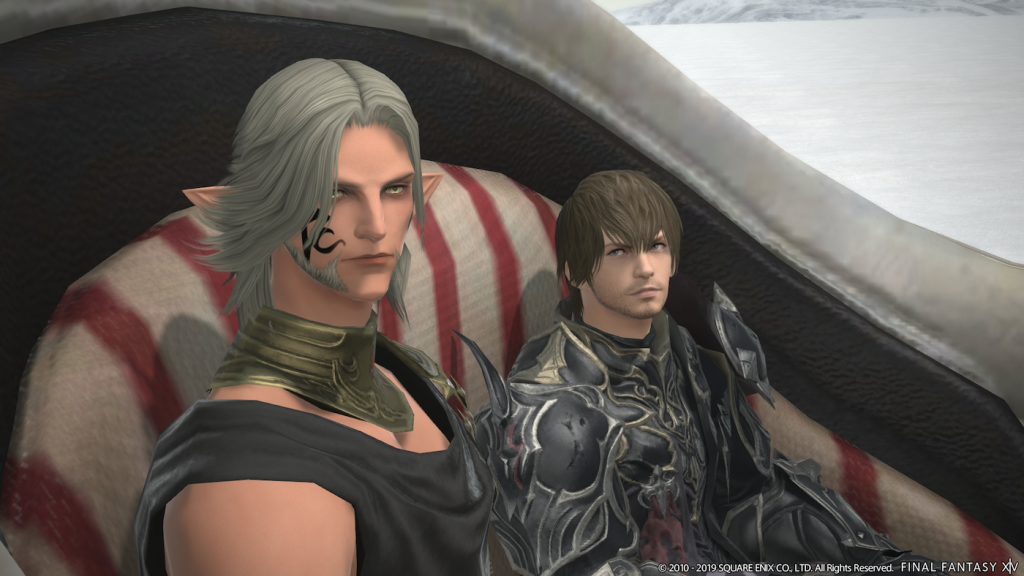
Review: Final Fantasy XIV: Shadowbringers
Final Fantasy 14’s latest expansion, Shadowbringers, has officially be out since July 2nd, 2019 and I figured with a month and some change since then, now would be the perfect time to express my thoughts on the expansion as a whole. Although I will do my best to discuss some themes and topics within Shadowbringers with as little spoilers as I can, I cannot guarantee that I won’t spoil at least one aspect of the game for you so possible spoilers beware.
For those unfamiliar with Final Fantasy 14, Final Fantasy 14 is Square Enix’s second MMO in the Final Fantasy series and has been continually receiving updates and expansions since it’s rebranding as Final Fantasy 14: A Realm Reborn in 2013. A Realm Reborn is considered version 2.0 (due to the original being 1.0) while the expansions started the 3.0, 4.0 and now with Shadowbringers, 5.0 patch versions. Roughly every 3 months new story quests get added into the game that allows for the continuation of the expansion’s and sometimes major plot lines from the base game until the release of the next expansion roughly 2 years later.
Shadowbringers continued this trend by picking up right where 4.55 ended, which meant figuring out why your playable character’s comrades were losing consciousness. It turns out, someone from a different parallel world (called a shard/reflection in game but I will use parallel world as it may be easier to understand than those terms) is pulling them into their world to help them with a plague of Light that is occurring. If you have played Final Fantasy 15, think of it as a Light-based version opposite of the Star scourge where instead of demons and perpetual darkness you get angelic enemies bathed in everlasting sunlight. The world is dying because of this and it is tasked to you and your companions to rectify the damage done.
I love this idea due to the fact that so often in storytelling we are told that Light is good and Darkness is evil but the narrative described in Shadowbringers destroys the notion by stating that Light and Darkness need equal balance, like all things, and too much of one thing can tip the scales and cause disaster. Alongside this theme of balance, you also are met with the notion of mortality, morality and justification.
Many of the characters you meet in the game have different motives than you, majority antagonistic, but to them they are doing what they believe is best for a world they believe beyond saving. To them, we are the villains, bringing hope to an otherwise doomed world who also are cruel enough to instill the idea that we can save them from their fate where instead those against us turn people to be complacent and pampered while awaiting their death. Despite me at first not understanding why the allure of why someone would choose to do nothing, I decided to take a moment to step into their shoes and wonder if our world was fated to die, would I take the path of countless failed adventurers or would I just use what little time I assumed I had left with loved ones? I honestly could not answer that.
Regret and guilt are also prevalent themes in the narrative through interactions with the main adversary, the benefactor that brought us into this world, and a ghostly companion of ours who are all sharing parts of their history that drive the roles they play in the story. Through their emotional trauma, you want to work with them in order to allow them to succeed in their goals in the present, but you can’t. Some views are simply incompatible and ultimately cause strife. I empathized with the pain of the main adversary and truly wanted to find a method of helping his cause as well as ours but the method that he wanted to implement was just inexcusable. After we bested him, however, his last words were not of malice or of hatred, but simply a plea to remember him and those that he fought to bring back. This was a moment that made me feel hollow during when I was supposed to feel victorious. Was I truly saving lives or was I really a villain?
You can’t change the past though, only accept that things have happened and move forward in a way you think can be beneficial and that is something I feel people may overlook while playing. The major characters of Shadowbringers all had things they wished to atone for and while they all had different reasonings, many focused on trying to do the best for them and their situation even if it caused them to be at odds with another. It’s this addition of characters with humanistic flaws and desires that I feel really fleshed out many of the characters introduced and even strengthened my attachment to characters I have spent years calling my comrades as I was able to see a much more personal side of each of them. The contrasts of these expanded personality traits and ideologies that manifested during our travels together, reinvigorated my love for many characters of whom I thought were a bit one dimensional. They were no longer simply stand ins for my mostly silent protagonist (more on that later) but had their own story to tell, both good and bad.
Now what I meant by mostly silent is that our character does speak to other characters and we do have little choices here and there for dialogue but for the most part our character just nods their head to whatever is going on in the story. In Shadowbringers, however, our playable character had some actual emotion and depth in the dialogue choices that felt impactful to the narrative. In fact, there was one conversation I had with one character and even though they simply just asked my character how they are feeling and what their thoughts were, I was taken aback. For the years I have played this game, my character was portrayed as this stoic, heroic being and while people cared for my well-being this was the first time I could remember where my playable character was asked to express themselves emotionally. And it didn’t happen just this once, there were multiple instances where characters would ask me to relax, take my time, and above all, take care of myself. And it made the journey and experience believable.
Sure, we are the heroes of legend, a person who has bested beasts and Gods alike, but we are still human. It is such a subtle story element, but it really lasted with me that, despite their being immense pressure to save the world from another calamity, those traveling alongside with me are making their best effort to not only support me physically but emotionally/mentally as well. The other aspect the characters also gave my playable character was agency. I wasn’t just a deus ex machina to save the day. I wasn’t a slave to fate nor forced to do anyone’s bidding. I was given the ability to see the world and the situation for what it was and base my choice after. Obviously, the story revolves you saving said world but the method of execution story wise entices you to do so not out of obligation but because you’ve interacted with the world and now know that without you, the people inhabiting this world will not live to see another. In previous expansions, many of our interactions with the expansion storyline felt forced and out of our hands but for most of the story, we choose the path we lead in this one and I can truly say I was proud of the way it was handled.
I could talk about Shadowbringers until I turn blue in the face but the best way to experience it is through playing it. I laid out a lot of the themes I noticed in the story but for the most part, the meat and potatoes of it is still ready for you to enjoy. If you are new to the story of Final Fantasy 14, prepare for a long journey ahead to make it to Shadowbringers as you have 6 years’ worth of story, lore, and gameplay to progress through but I promise once you do, you’ll be treated to what I consider one of the best storylines I have ever been presented with.






